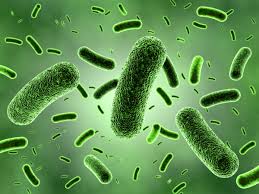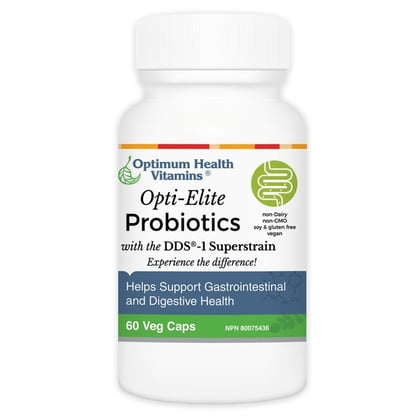 Due to personal experience, I have extensively investigated the question "what do probiotic supplements do for allergies?"
Due to personal experience, I have extensively investigated the question "what do probiotic supplements do for allergies?"
Do you remember when people eating yogurt were considered eccentric health nuts? It wasn't that long ago! After discovering antibiotics in the 1940's, it took conventional medicine over 50 years to acknowledge the idea that having the wrong bacteria and yeasts predominating in someones gut could be problematic, or even that probiotics could be helpful for issues such as yeast infections. (1)
It wasn't until the late 1990's that the broad range of health-promoting effects of friendly bacteria and yeasts was accepted into medical practice, and even then it happened largely because people were dieing in the hospital due to yeast overgrowth or Clostridium difficile after surgery/antibiotics. But those following natural strategies and using good probiotic bacteria to protect their health have been ahead of the game!
In 1983 I had a life-threatening car accident and sustained two broken femurs. Instead of putting me into casts, the doctors pinned one bone, and plated the other, yet I ended up with chronic staph-infections in both legs. Over a 4 year recovery process I went through 17 surgeries, and 11 months of antibiotic therapy.
Coming out of it my gut flora was decimated, and I found I had a lot of allergies and sensitivities to foods, particularly yeasts, sugar, soy and dairy, as well as moulds in foods and the environment. Fortunately, after experimenting with several different probiotics to reinstate my good bacteria, I discovered the Lactobacillus acidophilus DDS-1 strain was extremely helpful for counteracting the histaminic hay fever-type reactions that I would commonly get in a reaction, i.e. itchy eyes, plugged sinuses, runny nose, and sneezing, along with digestive disturbances, bloating and gas.
If I ran out, or couldn't access the particular DDS-1 probiotic product I liked, I would often try other probiotic combinations and strains, but I found none of them worked nearly as well. Even though I have such allergic reactions much less frequently now, I still find this is the case.
The DDS-1 acidophilus preparation I used was always combined with various Bifidobacteria, and was most effective when taken on an empty stomach. Particularly if I bit one of the capsules to get the powder into my mouth before swallowing, it would/will usually subside my allergic reaction within the hour...often within 15 minutes or so.
This was a case of an observed result preceding the science, because in the early 1990's, doing a BSc. in Foods and Nutrition, I would often look for studies to help explain this effect, but couldn't find much at the time.
Nonetheless, when I started consulting people on nutrition and supplements I was able to help many people with the same reactivity challenges with this DDS-1 probiotic.
 The connection between the pronounced effects of the probiotics on the gut, and the direct link to allergy-relief I got was unmistakeable, and with the research I had done, it seemed to make sense that if the wrong bacteria or yeasts were present in the gut that they would produce noxious by-products, and/or metabolic wastes, which then got absorbed, and caused the allergic responses.
The connection between the pronounced effects of the probiotics on the gut, and the direct link to allergy-relief I got was unmistakeable, and with the research I had done, it seemed to make sense that if the wrong bacteria or yeasts were present in the gut that they would produce noxious by-products, and/or metabolic wastes, which then got absorbed, and caused the allergic responses.
Though this is close to what happens, it's not the complete picture.
 In the late 1990's there was an explosion of research into probiotics and prebiotics, and at this time I got involved with the Institute for Functional Medicine, and learned about the major amount of immune tissue surrounding the gut, (i.e. the G.A.L.T. and the M.A.L.T. - Gastrointestinal and Mucosal associated lymphoid tissue)
In the late 1990's there was an explosion of research into probiotics and prebiotics, and at this time I got involved with the Institute for Functional Medicine, and learned about the major amount of immune tissue surrounding the gut, (i.e. the G.A.L.T. and the M.A.L.T. - Gastrointestinal and Mucosal associated lymphoid tissue)
There is more immune tissue surrounding your intestines than anywhere else in the body, and it can quickly be triggered to mount an inflammatory immune response, or with the right signals an anti-inflammatory effect can be achieved, and the immune response quieted. Yet, in either case you don't have to absorb the bacteria, or their metabolites. Their fragments just have to contact the gut wall, where they contact receptors that pass on the signals of alarm or calm. (11)
Either event can quickly trigger systemic effects, and may affect many different parts of the body. (2,3,4) In other words, reactions that start in the gut can have a huge array of different faces and manifestations. (5) And, since the presence of probiotics in your gut can exert a calming effect on the immune response, where contact with your intestines causes an anti-inflammatory effect to be passed on, probiotics can have a beneficial effects on a lot more than just the simple rhinitis-type reactions described above. (12)
For example: Eczema/dermatitis, asthmatic reactions, gastrointestinal pathologies such as inflammatory/irritable bowel syndromes or even many that you may never associate with the gut, such as effects on the nervous system, and even migraines may all benefit from the right probiotics. (5-10)
Though there are many probiotic foods to choose from, in my experience getting pronounced effects is more quickly achieved with a good probiotic supplement. But when you go to the store to get some, and are faced with a huge selection of products, how do you know which to choose?
Firstly, "more" does not always mean "more effective". High bacterial counts such as 50 or 100 Billion in each capsule definitely sound impressive, but depending on the bacterial strains that they contain, may not be the best for the results you are seeking.
Though they may contain the same species of bacteria, the various strains of acidophilus or other probiotics in a formula can definitely have distinctly different characteristics and effects. As I heard one of my mentors put it....you may want a dog, but are looking for a Great Dane, a Pit Bull, or a Chihuahua? Hence, taking a more potent strain of probiotics can exert greater effects then simply choosing one with high numbers.
Having used and recommended the DDS-1 strain of acidophilus, combined with various Bifidobacterium since 1993, I can definitely attest to its potency and effectiveness, particularly for allergies and various types of gut-reactivity. So when we recently had the chance to add the DDS-1 strain of probiotics to our line of supplements, we jumped at the opportunity to produce our own product called Opti-Elite Probiotics.
DDS-1 acidophilus has been intensively studied for over 35 years For an indepth review of the scientific evidence and benefits of Lactobacillus acidophilus DDS-1 see:
Lactobacillus acidophilus DDS-1 Review of Scientific Evidence.
 Yet, also know that each person is very individual in their probiotic populations. The bugs that inhabit your gut and body, (collectively known as the "microbiome") are as unique as your fingerprint... no one's is exactly the same. Therefore finding out which probiotic product or formula is best for you can definitely require some experimentation.
Yet, also know that each person is very individual in their probiotic populations. The bugs that inhabit your gut and body, (collectively known as the "microbiome") are as unique as your fingerprint... no one's is exactly the same. Therefore finding out which probiotic product or formula is best for you can definitely require some experimentation.
Related article: Who Needs Probiotics?
Continue to be well!
John

References
1) www.nrcresearchpress.com/doi/full/10.1139/cjm-2016-0733#.WQSk6mTyuqQ
2.) Allergy and the Gastrointestinal system
http://www.ncbi.nlm.nih.gov/pmc/articles/PMC2515351/
3.) Probiotic Immunomodulation in Health and Disease
http://jn.nutrition.org/content/130/2/403S.full
4.) Various effects of different probiotic strains in allergic disorders
https://www.ncbi.nlm.nih.gov/pmc/articles/PMC2883099/
5.) https://www.ncbi.nlm.nih.gov/pmc/articles/PMC1797898/
6.) https://link.springer.com/article/10.1007/s11882-014-0466-0
7.) https://www.ncbi.nlm.nih.gov/pmc/articles/PMC3539293/
8.) https://aacijournal.biomedcentral.com/articles/10.1186/1710-1492-5-5
9.) http://www.wageningenacademic.com/doi/pdf/10.3920/BM2015.0003
10.) http://onlinelibrary.wiley.com/doi/10.1111/j.1365-2672.2006.02963.x/full
11.) http://citeseerx.ist.psu.edu/viewdoc/download?doi=10.1.1.561.1888&rep=rep1&type=pdf
12. https://www.hindawi.com/journals/grp/2011/971938/

